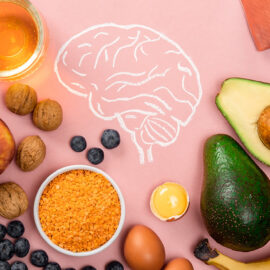It’s no secret that a healthy diet is critical for physical well-being, but science has proven that what you eat can greatly impact mental health, as well. Beneath the walls of the digestive system, the gut and brain communicate via chemical and physical connections and the mere thought of food releases gastric juices. Considering this undeniable connection, it’s important to ensure the gut is properly nourished and is supplied with healthy bacteria and depending on what you eat, your gut bacteria can flourish or flounder. The population of bacteria that makes its home in your gut is there because you touched it, ate it or drank it.¹ Nutrients in the gastrointestinal tract cause neural and hormonal signaling between the gut microbiota and the brain through secretion into the circulatory system and via the vagus nerve, known as the gut-brain axis.² A typical American diet of refined grains, fried foods, sugary treats and too much saturated fat negatively affects your gut microbiota and causes low-level inflammation through the release of lipopolysaccharides (LPS), which activates immune cells and influences inflammatory cytokine production (e.g. tumor necrosis factor-alpha, interleukins, etc.). ²,³ This can contribute to declines in mood and cognitive function and chronic metabolic diseases, such as type 2 diabetes and cardiovascular disease.4 Eating healthfully to nourish your gut microbiota is critical to reduce your risk for inflammation and is an important way to support brain and overall health.¹
The Gut-Brain Axis
The gut microbiota are involved with metabolizing the nutrients you eat into short-chain fatty acids (SCFAs), as well as neurotransmitters, such as γ-aminobutyric acid and serotonin, chemicals that affect brain function through the vagus nerve and interact with the immune system.2 SCFAs such as acetate, propionate and butyrate are a readily available energy source for the epithelial cells of the colon, the colonocytes, helping to maintain the colon barrier and prevent inflammatory compounds from entering circulation.6 Fermentable fibers, such as pectin found in berries and inulin found in artichokes, facilitate interaction with healthful, probiotic gut bacteria, resulting in the production of anti-inflammatory compounds such as SCFAs.5,6 Whole grain wheat fiber, has prebiotic effects increasing population of beneficial bacteria species Bifidobacteria and Lactobacillus.7 Although the mechanism is not fully understood, negative gut microbiota, such as growth of gram negative Enterobacteriaceae and suppression of healthful Bifidobacteria, is linked to inflammation suggesting an alteration in the crosstalk between gut immune cells and gut bacteria.8
What you eat allows beneficial bacteria to flourish and helps reduce permeability in the digestive tract, sometimes called leaky gut, which is at the root of this inflammation. A high-fat diet increases LPS production, and leaky gut allows LPS absorption into circulation, increasing inflammation and risk for anxiety, depression, and Alzheimer’s disease.2,4,5 Several studies have demonstrated a relationship between an imbalance in gut microbiota and increased susceptibility to psychiatric and neurologic changes.5
Saturated fats are related to negative changes in gut microbiota, leaky gut, weight gain, and pro-inflammatory status. Diets low in microbiota-accessible prebiotic fiber reduce the diversity of the microbiota; whereas high-fiber and low-sugar and low-fat dietary patterns are linked to microbiota diversity.2
Herbs and Spices Can Support Gut Health and Cognition
Many herbs and spices are rich in potent antioxidants, such as flavonoids and polyphenols, and research supports their antimicrobial and antiviral effects which are beneficial for gut microbiota.9,10 They add flavor and variety to foods and are easy to incorporate in a healthful diet. Here are a few common spices and herbs and that offer protective effects:
Turmeric: Curcumin, a polyphenol found in turmeric, is thought to exert positive effects on gut microbiota modulating richness, diversity and composition.11
Cinnamon: Cinnamon contains bioactive compounds procyanidin and cinnamaldehyde which have antioxidative effects, and antimicrobial action which helps modulate gut microbiota.10,12
Parsley: Parsley has a high flavonoid content including apigenin, isorhamnetin and luteolin, which are responsible for the antioxidative action of this herb. In vitro studies found that apigenin promotes growth and diversity of gut microbiota and production of healthful SCFAs and lowered Firmicutes to Bacteroidetes ratio, indicating positive changes in gut microbiota.10,13
Ginger: Gingerols, shogoals and paradols, the main phytochemicals in ginger, offer strong antioxidative properties linked to improvements in gut microbiota.14 The antibacterial properties of ginger contribute to its beneficial effects against harmful bacteria such as Esherechia coli and Staphylococus aureus, which helps modulate an overall healthy gut bacteria population.9,12
Food for Thought: Tips for Maintaining Healthy Gut Microbiota
Amazingly, the gut microbiome can shift temporarily within 24 hours after eating.12 Certain foods can improve gut microbiota composition and reduce low-level inflammation. A diet rich in fruits, vegetables, spices and herbs contains antioxidants which reduce oxidative stress and helps a healthy gut microbiota population flourish.10,14
Choose plant-based foods, herbs and spices, foods with probiotic cultures and foods with omega-3 fats more often, and limit meat, saturated fat and refined sugar to boost your population of healthy gut microbiota and reduce levels of inflammation.3 Here are some important changes to consider making to improve your gut microbiota.
Fiber: Choose more foods with fermentable fibers to increase production of SCFAs which can be absorbed and metabolized to produce energy in the body. Fermentable fibers can be found in oats, barley, pulses, legumes and fruit.5,6 Whole grain and wheat bran are linked to increased population of healthful gut Bifidobacteria and Lactobacillus.7,12
Herbs and spices: Support gut microbiota and add flavor and variety to a healthful diet with herbs and spices such as cinnamon, parsley, ginger and turmeric.9,10
Mushrooms: Mushrooms have antioxidative, cholesterol-lowering, anti-inflammatory and anti-microbial properties. The polysaccharides found in mushrooms are thought to provide prebiotic effects as well as immunomodulatory effects to activate and regulate gut microbiota.15
Limit meat: A diet high in meat and low in plant-based foods is linked with less bacterial diversity and an overgrowth of harmful bacteria.5,12
Limit refined sugar: A diet high in fat and refined sugar has been linked to inflammation and memory impairment.3,4 Inadequate fiber, high fat and high sugar intake is linked to declines in gut microbiota richness and function.1,5 Consuming less refined sugar can improve gut microbiota diversity, and a high refined sugar intake can increase the Firmicutes to Bacteroidetes ratio, indicating negative changes in gut microbiota.2
Foods developed with probiotic cultures and dairy: A 2020 systematic review of the effects of dairy on gut microbiota found that milk, yogurt and kefir consumption promoted the growth of healthful gut Lactobacillus and Bifidobacterium. During digestion, milk proteins can produce bio-active peptides with antimicrobial properties that benefit the gut microbiota.16 Fermented dairy products such as yogurt and kefir supply probiotic bacteria promoting the growth a healthful gut microbiota population. Soy, almond and other plant-based products are being developed with probiotic cultures, and although research in this area is limited, these products hold promise as an alternative to fermented dairy.16,17
Limit excess fat and choose omega-3 fatty acids: Fats play a role in the structure of gut microbiota, and a high-fat diet, especially saturated fat, promotes negative bacteria population in the gut. Omega-3 fatty acids alpha-linolenic acid (ALA), eicosapentaenoic acid (EPA), and docosahexaenoic acid (DHA) promote healthy gut microbiota, help mediate inflammation and enhance immunity in the body.2,3,14,18 Chia seeds, flaxseeds and walnuts are rich in ALA. Fatty fish such as salmon, herring and sardines are a good source of DHA and EPA, and foods made with algal EPA and DHA are available for those following a vegan or vegetarian diet.19
Here are some gut-friendly food swaps to share with your patients or to help get you started on ways to improve your gut health to benefit your brain and body. Including Orgain Superfoods + Immunity Up!™ Powder in meals or snacks is another great way to support gut health as it contains superfoods, probiotics, and beneficial herbs and spices.
| Choose This | Lose This | Benefit |
|---|---|---|
| Baked potato flavored with salsa, plain yogurt, herbs and spices | Baked potato with butter and sour cream | Decreases total fat and saturated fat. Increases probiotic cultures and spices and herbs. |
| Broccoli with olive oil, herbs and spices | Broccoli with cheese sauce | Decreases saturated fat. Increases intake of spices and herbs. |
| Whole wheat or sprouted grain toast with mashed avocado | White toast with butter | Decreases saturated fat. Increases fiber. |
| Tea with mint leaves over ice | Sweet iced tea | Decreases refined sugar. |
| Seltzer with fresh lemon | Regular soda | Decreases refined sugar. |
| Oatmeal | Cereal with refined grains | Increases fiber. |
| Whole wheat or legume pasta | White flour pasta | Increases fiber. |
| Roasted edamame or chickpeas | Potato chips | Decreases fat. Increases fiber. |
| Pinto beans with vegetables, olive oil, vinegar, herbs, spices and sliced avocado | Refried beans with sour cream and cheese | Decreases saturated fat. Increases spices and herbs. |
| Vegetarian chili with pulses, mushrooms and other vegetables and plain yogurt | Beef chili with sour cream and cheese | Decreases meat and saturated fat. Increases fiber and probiotic cultures |
| Sardine salad sandwich on whole wheat bun | Fried fish sandwich on white bun | Decreases saturated fat. Increases omega-3 fats. |
| Sardine salad sandwich on whole wheat bun | Fried fish sandwich on white bun | Decreases saturated fat. Increases omega-3 fats. |
| Hamburger made with a blend two thirds ground beef with one third mashed, cooked lentils | Hamburger | Decreases meat and saturated fat. Increases fiber. |
| Yogurt with berries | Yogurt with chocolate chips | Decreases fat and refined sugar. Increases fiber. |
![]()
1 Moszak M, Szulińska M, Bogdański P. You Are What You Eat-The Relationship between Diet, Microbiota, and Metabolic Disorders-A Review. Nutrients. 2020;12(4):1096. Published 2020 Apr 15. doi:10.3390/nu12041096
2 Torres-Fuentes C, Schellekens H, Dinan TG, Cryan JF. The microbiota-gut-brain axis in obesity. Lancet Gastroenterol Hepatol. 2017 Oct;2(10):747-756. doi: 10.1016/S2468-1253(17)30147-4. Epub 2017 Aug 24. PMID: 28844808.
3 Agus A, Denizot J, Thévenot J, Martinez-Medina M, Massier S, Sauvanet P, Bernalier-Donadille A, Denis S, Hofman P, Bonnet R, Billard E, Barnich N. Western diet induces a shift in microbiota composition enhancing susceptibility to Adherent-Invasive E. coli infection and intestinal inflammation. Sci Rep. 2016 Jan 8;6:19032. doi: 10.1038/srep19032. PMID: 26742586; PMCID: PMC4705701.
4 Agustí A, García-Pardo MP, López-Almela I, et al. Interplay Between the Gut-Brain Axis, Obesity and Cognitive Function. Front Neurosci. 2018;12:155. Published 2018 Mar 16. doi:10.3389/fnins.2018.00155
5 Estrada JA, Contreras I. Nutritional Modulation of Immune and Central Nervous System Homeostasis: The Role of Diet in Development of Neuroinflammation and Neurological Disease. Nutrients. 2019 May 15;11(5):1076. doi: 10.3390/nu11051076. PMID: 31096592; PMCID: PMC6566411.
6 Oregon State University. Linus Pauling Institute. Micronutrient Information Center. Fiber. Available at: https://lpi.oregonstate.edu/mic/other-nutrients/fiber, accessed 2/12/2022
7 Costabile A, Klinder A, Fava F, Napolitano A, Fogliano V, Leonard C, Gibson GR, Tuohy KM. Whole-grain wheat breakfast cereal has a prebiotic effect on the human gut microbiota: a double-blind, placebo-controlled, crossover study. Br J Nutr. 2008 Jan;99(1):110-20. doi: 10.1017/S0007114507793923. Epub 2007 Aug 29. PMID: 17761020.
8 Calder PC, Bosco N, Bourdet-Sicard R, Capuron L, Delzenne N, Doré J, Franceschi C, Lehtinen MJ, Recker T, Salvioli S, Visioli F. Health relevance of the modification of low grade inflammation in ageing (inflammageing) and the role of nutrition. Ageing Res Rev. 2017 Nov;40:95-119. doi: 10.1016/j.arr.2017.09.001. Epub 2017 Sep 9. PMID: 28899766.
9 Panpatil, V.V., Tattari, S., Kota, N., Nimgulkar, C.C., & Polasa, K. (2013). In vitro evaluation on antioxidant and antimicrobial activity of spice extracts of ginger, turmeric and garlic. Journal of Pharmacognosy and Phytochemistry, 2, 143-148.
10 Yashin A, Yashin Y, Xia X, Nemzer B. Antioxidant Activity of Spices and Their Impact on Human Health: A Review. Antioxidants (Basel). 2017;6(3):70. Published 2017 Sep 15. doi:10.3390/antiox6030070
11 Scazzocchio B, Minghetti L, D’Archivio M. Interaction between Gut Microbiota and Curcumin: A New Key of Understanding for the Health Effects of Curcumin. Nutrients. 2020;12(9):2499. Published 2020 Aug 19. doi:10.3390/nu12092499
12 Singh RK, Chang HW, Yan D, et al. Influence of diet on the gut microbiome and implications for human health. J Transl Med. 2017;15(1):73. Published 2017 Apr 8. doi:10.1186/s12967-017-1175-y
13 Wang M, Firrman J, Zhang L, et al. Apigenin Impacts the Growth of the Gut Microbiota and Alters the Gene Expression of Enterococcus. Molecules. 2017;22(8):1292. Published 2017 Aug 3. doi:10.3390/molecules22081292
14 Riaz Rajoka MS, Thirumdas R, Mehwish HM, et al. Role of Food Antioxidants in Modulating Gut Microbial Communities: Novel Understandings in Intestinal Oxidative Stress Damage and Their Impact on Host Health. Antioxidants (Basel). 2021;10(10):1563. Published 2021 Sep 30. doi:10.3390/antiox10101563
15 Jayachandran M, Xiao J, Xu B. A Critical Review on Health Promoting Benefits of Edible Mushrooms through Gut Microbiota. Int J Mol Sci. 2017;18(9):1934. Published 2017 Sep 8. doi:10.3390/ijms18091934
16 Aslam H, Marx W, Rocks T, et al. The effects of dairy and dairy derivatives on the gut microbiota: a systematic literature review. Gut Microbes. 2020;12(1):1799533. doi:10.1080/19490976.2020.1799533
17 Crosby L, Davis B, Joshi S, et al. Ketogenic Diets and Chronic Disease: Weighing the Benefits Against the Risks. Front Nutr. 2021;8:702802. Published 2021 Jul 16. doi:10.3389/fnut.2021.702802
18 Tangyu M, Muller J, Bolten CJ, Wittmann C. Fermentation of plant-based milk alternatives for improved flavour and nutritional value. Appl Microbiol Biotechnol. 2019;103(23-24):9263-9275. doi:10.1007/s00253-019-10175-9
19 National Institutes of Health. Office of Dietary Supplements. Omega-3 Fatty Acids. Available at: https://ods.od.nih.gov/factsheets/Omega3FattyAcids-HealthProfessional/#h3, accessed 2/13/2022



